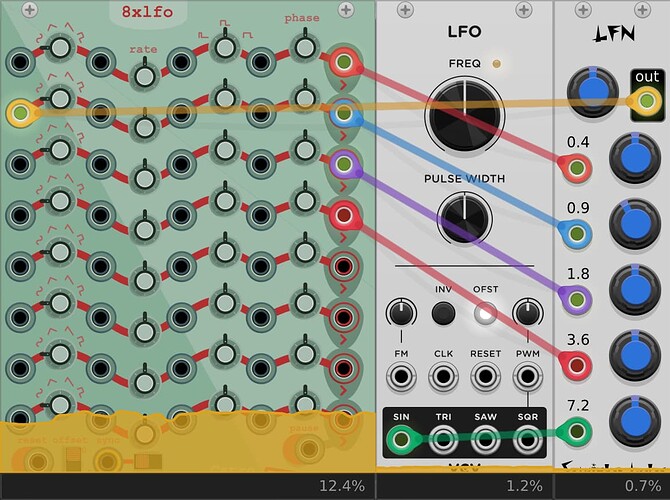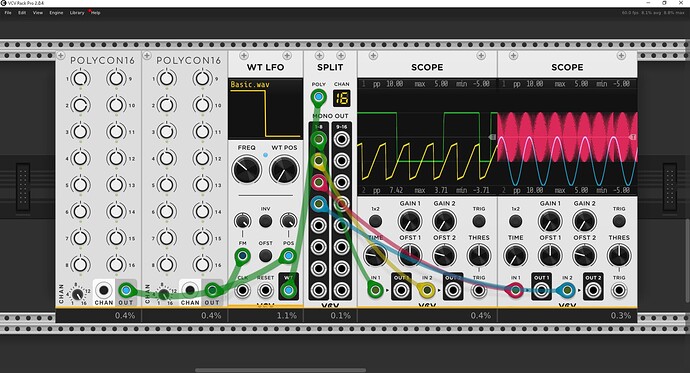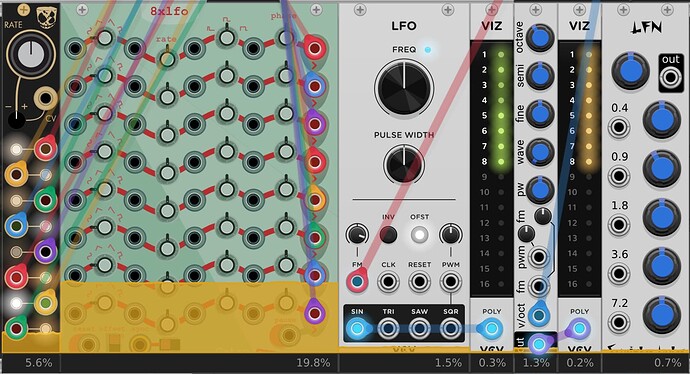I really love how this module has several decoupled lfos. Does anyone know of other LFOs with this property? I know I can get this effect by having multiple copies of other LFOs with different frequencies but I like how ochd does it all in one module.
Not as convenient as it is much larger, does not preconfigure all 8 LFOs to be out of sync, and uses about twice as much CPU when all 8 are in use.
But it is also much more flexible with control over the rate and phase of each LFO, morphable waveform control between sine, triangle, saw, and square (with PW modulation), option for unipolar or bipolar, and more…
It doesn’t have a convenient CV input to modulate all 8 LFO rates at once. But you can set all 8 to different rates with the knobs, and then patch the same CV control to all 8 to get the same effect.
Out of curiosity, why not just use Ochd? But something fun you can try is taking advantage of polyphony. You can use, for example, the VCV LFO, and with the help of PolyCon8 or 16, you can have up to 16 different LFOs. You can offset their frequency and their shape, and split the results.
Is it available for vcv? … oh, it is. I need to get used to the new library. I miss subscribing to the whole plugin.
On using PolyConxx + WT LFO + Polyphony
As an “analyst” by nature and profession, I love these kind of deceivingly simple, elegant and generic solutions. They show how a deeper understanding on how stuff actually works enables exploiting the full potential of functionality.
Both on a per component (module) level and in relation to other components (modules) in a system. Where a system is a collection of interacting/collaberating components to achieve some specific goal. Which is what the modular environment is designed for.
This pretty universal solution to this pretty universal problem (multiple LFO’s/controllers with different properties (rate, shape etc)) is MEGA usefull. Thanks for sharing the concept.
@Omri_Cohen On a more personal level: Keep up the good work of informing, educating and inspiring the evergrowing modular community.
Stages (aka. Audible Instruments::Segment Generator) can give you 6 un-synced and arbitrary speed LFO’s, of shapes of your choice, but you can also choose to sync some of them. So arguably more versatile but of course the genius of Ochd is packing it all down in and affordable 4hp package.
If you want to have more control over the uncoupled ratios you could use shapemaster. And the Pro-Version would give you all kinds of modulation options as well.
I appreciate it!
Knowledge without application has no value. So your contributions to both knowledge and application are much appreciated.
Why not just use Ochd? I do. It’s been in pretty much every patch I’ve made since I saw it in your latest fix rack video. I’m curious about other options to have more tools in my tool box. I’ve also started making my own modules and it’s helpful to know what’s already out there.
Also thanks for all your videos.
Thanks for the catronomix sugustion. I will definitely try it out!
I forgot about stages and all all map also did not realize it could be an lfo. Thanks for that sugustion!
After seeing @Squinky post, I remember why I have not adopted it in any of my patches - it really is a CPU hog. It seems every time you patch another port it noticeably increases the CPU usage. Unfortunate.
I have not played around with Shape Master. I’ll have to give it a try. Thanks for pointing out it can do LFOs too!
ShapeMaster and the paid for version ShapeMaster Pro are amazing modules and certainly worth adding to anyones collection of modules. They are simple to understand, highly versatile and also extremely deep. Like the proverbial Swiss Army Knife.
The project is open source but I don’t see any obvious slow bits in the code, that said I don’t have a lot of experience optimizing c++ code. Maybe @catronomix is still active and interested in improving the performance?
For Shapemaster (and many other tips & tricks), check out this series of deep dives into the many applications and potential of MindMeld Shapemaster by modular magician Jakub Ciupinski.
Ok, Now I got Orchd, and as @DaveVenom says it uses less than half the CPU the catronomix does. Many people probably don’t know that Fundamental LFO is polyphonic, so I showed it here producing 8 LFOs. On the right are some module I made for comparison, although neither is really an LFO.
I think you can see here that Ochd isn’t really great with the CPU usage either, but it’s better.
I took a look at why catronomix uses so much CPU. First thing I saw is that the sine output uses the c sinf function which is terribly slow. A few years ago everyone was doing that. But since then they figured out not to do it, or they read my paper. As it says, using sin library function is about the slowest way possible to do this. Demo/docs/efficient-plugins.md at main · squinkylabs/Demo · GitHub




